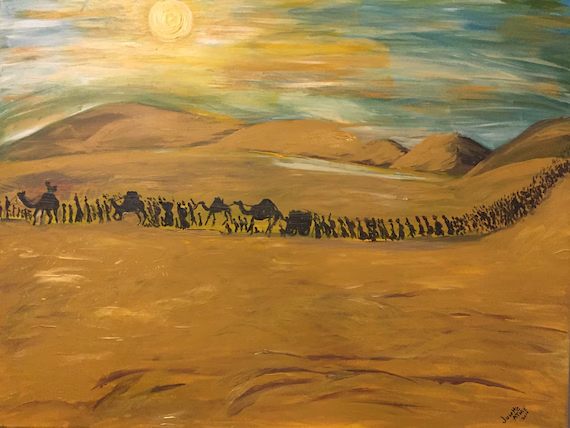Rebuilding Jerusalem
Nehemiah lived in the palace in Persia, serving the King as his cup-bearer.
When he heard that the Temple in Jerusalem had been rebuilt, but that the walls of the city were still in ruins, he was very upset. He was a Jew who cared very much for his people.
He went without food for several days and prayed to God for help.
When he served wine to King Ataxerxes one evening, the King noticed that Nehemiah looked sad. 'Why are you so unhappy? Are you ill? He asked.
'No, sire, replied Nehemiah. He was very frightened to speak to the king, but he prayed silently to God. Then he said; 'I'm sad because Jerusalem, the city of my ancestors, is in ruins.
I beg you to let me go to help rebuild it.
The King agreed to let Nehemiah go: he ordered soldiers to go with him, and sent letters to the governors of the provinces Nehemiah would travel through, to see that he was safe and to give him any help he needed.
When Nehemiah reached Jerusalem, he stayed there for three days. Then, one night, he rode all around the city with a few men, looking at the walls.
He didn't tell anyone what he was doing. In the morning, he went to the priests and the leaders of the people.
'Let's rebuild our city to make it great once again. We should be ashamed of the broken walls and ruined gates. God will help us, he said.
He told them how his prayers had been answered, and that the King of Persia had let him come back to work in Jerusalem.
Nehemiah was appointed governor of Judah, and he organized groups of volunteers. Each family set to work on the walls and gates nearest their homes, building and repairing.
Some of the people who lived there didn't want Jerusalem to be a strong city again. They jeered at the Jews and tried to stop the work.
'What do these feeble Jews think they're doing? They asked.
'Do they think they can build a city out of rubble? Even a fox could knock down these walls.
The Jews worked on, encouraged by Nehemiah. 'God is with us and will help us. He said.
Then the enemies of the Jews planned an attack, but Nehemiah was ready for them.
Again, he prayed for God's help, and placed guards to protect the walls by day and night.
During the day, half the people worked on the walls, while the other half stood guard.
The enemies tried again. They sent many messages to Nehemiah, saying; 'Let's meet outside the city and talk.
Nehemiah always replied. 'The work is too important. I'm too busy to stop and talk.
With God's help, the work on the city walls was finished in fifty-two days. Jerusalem was a strong. Walled city again.
The Jews held a great celebration, marching around the city, and singing their thanks to God. Everyone was very excited and happy.
When all the people arrived at the water gate. Ezra the scholar read them the Laws of God and explained them.
The people prayed to God that He would forgive them the wrongs they had done: they promised always to love Him and obey His Laws.










Comments
Post a Comment